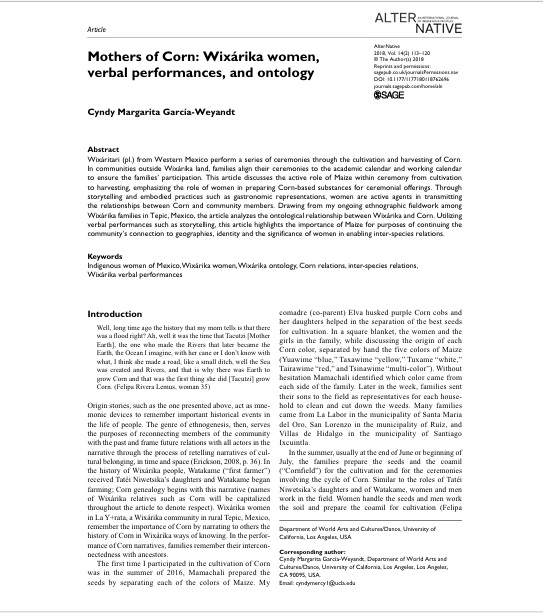Mothers of Corn: Wixárika women, Verbal Performances, and Ontology
Wixáritari (pl.) from Western Mexico perform a series of ceremonies through the cultivation and harvesting of Corn. In communities outside Wixárika land, families align their ceremonies to the academic calendar and working calendar to ensure the families’ participation. This article discusses the active role of Maize within ceremony from cultivation to harvesting, emphasizing the role of women in preparing Corn-based substances for ceremonial offerings. Through storytelling and embodied practices such as gastronomic representations, women are active agents in transmitting the relationships between Corn and community members. Drawing from my ongoing ethnographic fieldwork among Wixárika families in Tepic, Mexico, the article analyzes the ontological relationship between Wixárika and Corn. Utilizing verbal performances such as storytelling, this article highlights the importance of Maize for purposes of continuing the community’s connection to geographies, identity and the significance of women in enabling inter-species relations.
"Well, long time ago the history that my mom tells is that there was a flood right? Ah, well it was the time that Tacutzi [Mother Earth], the one who made the Rivers that later became the Earth, the Ocean I imagine, with her cane or I don’t know with what, I think she made a road, like a small ditch, well the Sea was created and Rivers, and that is why there was Earth to grow Corn and that was the first thing she did [Tacutzi] grow Corn. (Felipa Rivera Lemus, woman 35)
Origin stories, such as the one presented above, act as mne monic devices to remember important historical events in the life of people. The genre of ethnogenesis, then, serves the purposes of reconnecting members of the community with the past and frame future relations with all actors in the narrative through the process of retelling narratives of cul tural belonging, in time and space (Erickson, 2008, p. 36). In the history of Wixárika people, Watakame (“first farmer”) received Tatéi Niwetsika’s daughters and Watakame began farming; Corn genealogy begins with this narrative (names of Wixárika relatives such as Corn will be capitalized throughout the article to denote respect). Wixárika women in La Y+rata, a Wixárika community in rural Tepic, Mexico, remember the importance of Corn by narrating to others the history of Corn in Wixárika ways of knowing. In the performance of Corn narratives, families remember their interconnectedness with ancestors."
Download and read full article here.






